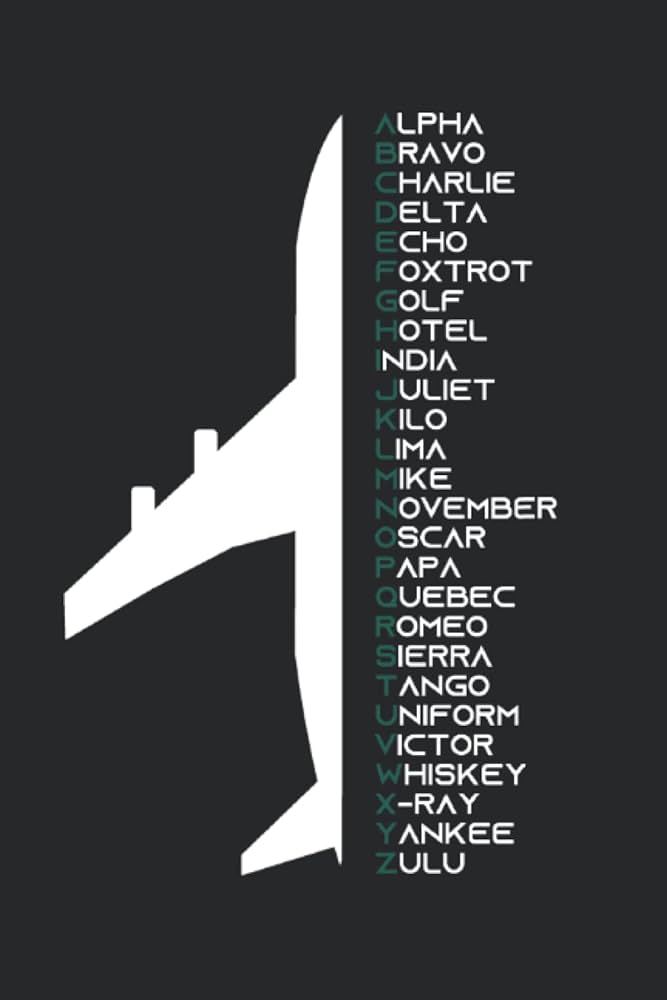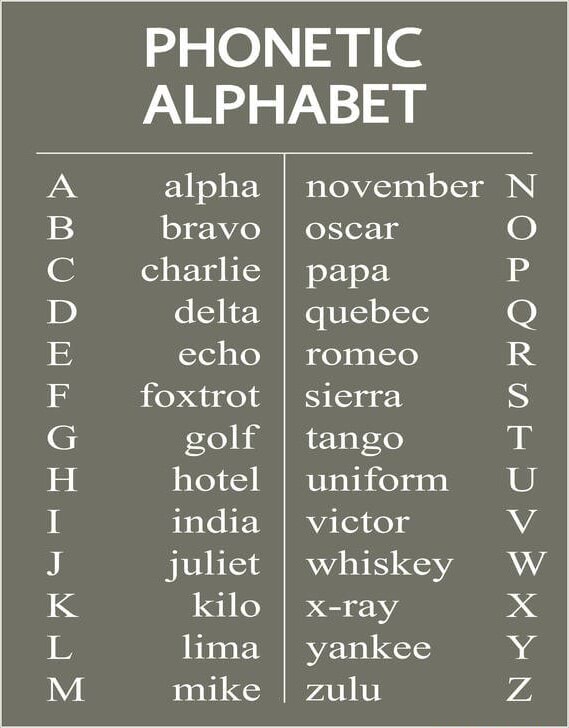Alfa beta charlie delta echo foxtrot golf hotel india juliet

Nato Phonetic Alphabet Alpha Bravo Charlie Delta Echo Foxtrot Golf Hotel India Juliet Kilo Lima Mike t-shirt. Categories Hobbies, Lifestyle, BlackStyle. Alpha Bravo Charlie Delta Echo Foxtrot Golf Hotel India Juliet Kilo Lima Mike Oscar Papa Romeo Sierra Tango Victor Whiskey Xray Yankee Zulu. Buy now Airplane Nato Phonetic Alphabet Alpha Bravo Charlie Delta Echo Foxtrot Golf Alfa beta charlie delta echo foxtrot golf hotel india juliet India Juliet Kilo shirt is one of the best-selling items. Alpha Bravo Charlie Delta Echo Foxtrot Golf Hotel India Juliet Kilo. 1 kilo of Charlie-Alfa-Romeo-Romeo-Oscar-Tango.
Amazon Prime includes:
Full content visible, double tap to read brief content. Help others learn more about this product by uploading a video. Customer reviews. How customer reviews and ratings work Customer Reviews, including Product Star Ratings help customers to learn more about the product and decide whether it is the right product for them.
Learn more how customers reviews work on Amazon. Images in this review. Sort reviews by Top reviews Most recent Top reviews. Top review from the United States. There was a problem filtering reviews right now. Please try again later. See more reviews. Your recently viewed items and featured recommendations. Back to top. Get to Know Us. Make Money with Us.
Amazon Payment Products. Let Us Help You. Alfa beta charlie delta echo foxtrot golf hotel india juliet Amazon Music Stream millions of songs. Amazon Ads Reach customers wherever they spend their time. Sell on Amazon Start a Selling Account. AmazonGlobal Ship Orders Internationally. Shopbop Designer Fashion Brands. Deals and Shenanigans. The digit 3 is specified as tree so that it is not pronounced sri ; the long pronunciation of 4 still found in some English dialects keeps it somewhat distinct from for ; 5 is pronounced with a second "f" because the normal pronunciation with a "v" is easily confused with "fire" a command to shoot ; and 9 has an extra syllable to keep it distinct from the German word nein "no".
Prior to , three and five had been pronounced with the English consonants, but as two syllables. For direction presented as the hour-hand position on a clock, "ten", "eleven" and "twelve" may be used with "o'clock". Both authorities indicate that a non-rhotic pronunciation is standard. That of the ICAO, first published in and reprinted many times without correction vd.
The DIN consolidated all six into the single low-central vowel [a].  The DIN also reduced the number of stressed syllables in bravo and x-ray , consistent with the ICAO English respellings of those words and with the NATO change of spelling of x-ray to xray so that people would know to pronounce it as a single word.
The DIN also reduced the number of stressed syllables in bravo and x-ray , consistent with the ICAO English respellings of those words and with the NATO change of spelling of x-ray to xray so that people would know to pronounce it as a single word.
There is no authoritative IPA transcription of the digits. However, there are respellings into both English and French, which can be compared to clarify some of the ambiguities and inconsistencies. Others are: 'colon', 'semi-colon', 'exclamation mark', 'question mark', 'apostrophe', 'quote' and 'unquote'. Prior to World War I and the development and widespread adoption of two-way radio that supported voice, telephone spelling alphabets were developed to improve communication on low-quality and long-distance telephone circuits.
The experience gained with that alphabet resulted in several changes being made during by the ITU. Throughout World War II, many nations used their own versions of a spelling alphabet. The U. At least two of the terms are sometimes still used by UK civilians to spell words over the phone, namely F for Freddie and S for Sugar.
To enable the U. The CCB alphabet itself was based on the U. Army Field Manuals in the series. Several of these documents had revisions, and were renamed. Major F. Handy, directorate of Communications in the Army Air Force and a member of the working committee of the Combined Communications Board , enlisted the help of Harvard University's Psycho-Acoustic Laboratory, asking them to determine the most successful word for each letter when using "military interphones in the intense noise encountered in modern warfare.
According to a report on the subject:. The results showed that many of the words in the military lists had a low level of intelligibility, but that most of the deficiencies could be remedied by the judicious selection of words from the commercial codes and those tested by the laboratory. In a few instances where none of the words could be regarded as especially satisfactory, it was believed possible to discover suitable replacements.
Other words were tested and the most intelligible ones were compared with the more desirable lists. After World War II, with many aircraft and ground personnel from the allied armed forces, "Able Baker" was officially adopted for use in international aviation. However, many sounds were unique to English, so an alternative "Ana Brazil" alphabet was used in Latin America.
After further study and modification by each approving body, the revised alphabet was adopted on 1 November , to become effective on 1 April for civil aviation but it may not have been adopted by any military. Problems were soon found with this list. Some users believed that they were so severe that they reverted to the old "Able Baker" alphabet.
Confusion among words like Delta and Extra , and between Nectar and Victor , or the poor intelligibility of other words during poor receiving conditions were the main problems. Later in , ICAO decided to revisit the alphabet and their research. To identify the deficiencies of the new alphabet, testing was conducted among speakers from 31 nations, principally by the governments of the United Kingdom and the United States.
Among the more interesting of the research findings was that "higher noise levels do not create confusion, but do intensify those confusions already inherent between the words in question". By early the ICAO was nearly complete with this research, and published the new official phonetic alphabet in order to account for discrepancies that might arise in communications as a result of multiple alphabet naming systems coexisting in different places and organizations.
Air Force research. After all of the above study, only the five words representing the letters C, M, N, U, and X were replaced. It was finally adopted by the IMO in In the official version of the alphabet, [4] two spellings deviate from the English norm: Alfa and Juliett.
Alfa is spelled with an f as it is in most European languages because the spelling Alpha may not be pronounced properly by native speakers of some languages — who may not know that ph should be pronounced as f. The spelling Juliett is used rather than Juliet for the benefit of French speakers, because they may otherwise treat a single final t as silent.
For similar reasons, Charlie and Uniform have alternative pronunciations where the ch is pronounced "sh" and the u is pronounced "oo". Early on, the NATO alliance changed X-ray to Xray in its version of the alphabet to ensure that it would be pronounced as one word rather than as two, [35] while the global organization ICAO keeps the spelling X-ray.
For the and phonetics, each transmission of figures is preceded and followed by the words "as a number" spoken twice. The ITU adopted the IMO phonetic spelling alphabet in , [50] and in specified that it be "for application in the maritime mobile service only". Pronunciation was not defined prior to For the post phonetics, the underlined syllable of each letter word should be emphasized, and each syllable of the code words for the post figures should be equally emphasized.
The Radiotelephony Spelling Alphabet is used by the International Civil Aviation Organization for international aircraft communications. Odds for players Since 'Nectar' was changed to 'November' in , the code has been mostly stable. However, there is occasional regional substitution of a few code words, such as replacing them with earlier variants, because of local taboos or confusing them with local terminology.
Contents move to sidebar hide. Article Talk. Read Edit View history. Tools Tools. Download as PDF Printable version. This is the latest accepted revision , reviewed on 4 May Letter names for unambiguous communication. Not to be confused with International Phonetic Alphabet. ICAO spelling alphabet.
Problems playing this file. See media help. This section needs additional citations for verification. Please help improve this article by adding citations to reliable sources in this section. Unsourced material may be challenged and removed. Archived from the original on 27 December Retrieved 1 January North Atlantic Treaty Organization. Archived PDF from the original on 25 September Retrieved 16 February International Civil Aviation Organization.
Archived from the original on 20 June Retrieved 2 July Archived PDF from the original on 12 April National Communications System. Archived from the original on 29 October Retrieved 11 November Archived from the original on 11 November Archived PDF from the original on 3 October Archived from the original on 6 March Retrieved 22 August Archived from the original on 12 February Retrieved 23 January July Archived from the original on 11 July Retrieved 18 June DIN Retrieved 27 December Archived from the original on 26 June Archived PDF from the original on 9 December Retrieved 10 November Archived from the original on 20 January Retrieved 20 January Archived from the original PDF on 7 November Retrieved 31 October International Code of Signals , p.
Fourth edition, London.
Popular Pages
- Vegas odds british open
- Betting on golf 5 players
- Sentry tournament of champions power rankings
- 3m open leaderboard today
- Ryder cup team odds
- Bet rivers golf
- Odds to win ryder cup
- Liv adelaide 2024
- Us masters
- Bets golf clubs dallas
- Golf paramutual betting system pc software
- Open golf betting guide
- Current golf odds
- Honda classic leaderboard
- Golf betting players 2019